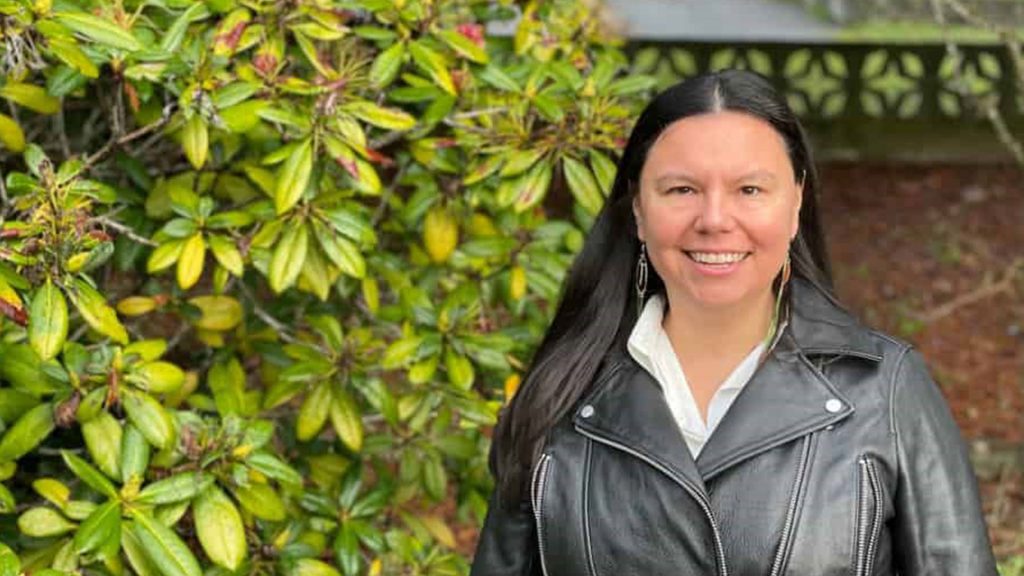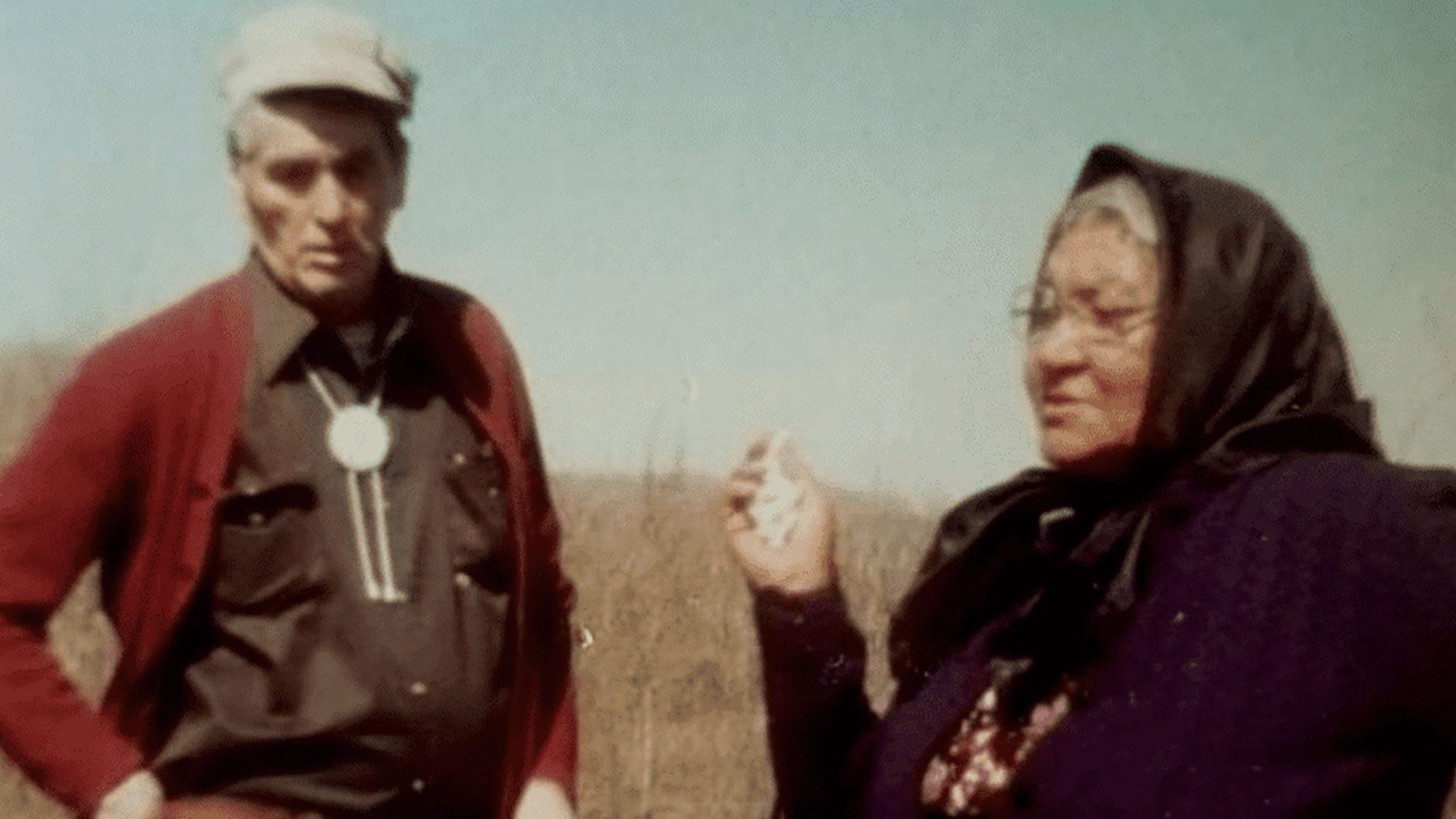
'I would be shocked if there weren’t hundreds of other similar collections of memories out there,' says Eden Fine Day. Photo: submitted.
A Saskatchewan-born nehiyaw iskwew writer is sharing the stories of her grandfather.
Eden Fine Day is on what they call the council of Aunties at the online publication IndigiNews.
She has roots in Sweetgrass First Nation east of the Battlefords in Treaty 6 Territory.
A series of newsletters from the all-Indigenous, woman-run IndigiNews is featuring the stories of Fine Day’s grandfather, Alphonse Little Poplar, and her grandmother, Irene Fineday.
The stories offer a glimpse into life in residential school and later, day-to-day life on the Sweetgrass reserve.
But, the story of how Eden Fine Day came into possession of her grandfather’s stories is interesting on its own.
She said her grandparents always welcomed outsiders who wanted to come spend time on the reserve.
On a number of occasions, people would come and camp out on Sweetgrass. One of those was a family friend, David Doyle, who came to stay in 1986.
“He spent three months staying in one of their outbuildings on the family land on Sweetgrass First Nation, and my grandfather Alphonse was like an archivist of our family history. He actually recorded interviews with elders and was really interested in preserving the comings and goings,” Fine Day said.
“He kept a journal where he talked about what happened every single day. Just a few notes on what he did every single day, who came to visit and all of that.”
She said when Doyle came to stay, he had a small tape recorder and he would spend evenings with her grandfather, just listening and asking questions about what he had to say about going to Thunderchild Residential School.
The School operated from 1901 to 1948 at what became Delmas, northwest of the Battlefords.
By the time Doyle left the reserve, he had collected a number of small cassettes containing his interviews with Little Poplar and eventually had the interviews transcribed.

Fine Day said, unfortunately, over time all of the cassettes—except one – were accidentally destroyed. She wasn’t even aware the tapes or transcripts existed until 2020.
“David Doyle reached out to me and came over to my house in person in New Westminster (B.C.). He brought this briefcase that used to belong to my grandfather with all of the printed out (transcripts) and the one surviving cassette,” Fine Day said.
“We had a little ceremony right on my porch. He’s not an Indigenous person, but he presented me with sweetgrass and he handed me the briefcase with all of my grandfather’s stories in it. He said ‘I’m giving you the rights, I’m giving you everything, this is your grandfather’s work.’”
What’s come out of the briefcase, is a series of short stories, now being published by IndigiNews in a digital newsletter.
She said David Doyle had already broken them up into little stories and gave them titles.
“So, he had already sort of editorialized it or organized it in a way that was really easy to publish.” Fine Day said. “We just tried to put them together in a way that flows, so the last one we do in the fifth week will be called Graduation, and will be my grandfather talking about what he did when he left and why he left residential school, how old he was and finishing that chapter of his life.”
The first four weeks focus more on day-to-day life for her grandfather in the residential school.
“Stories, just recollections, little anecdotes about interactions he had with nuns and priests and other students. The names of them, what happened to them. Really just telling his stories as a child,” Fine Day said.
Below is an excerpt from IndigiNews publication:
“There is another damn thing they used to give us at school. Early In the morning, we would go to a chapel, a kind of a church inside the building. It was quite a long walk, damn near to the other end of the building, to the girl’s side.
Before we left our dormitory, there was a door that we had to go through to get out to the hallway. Standing there was a guy and he’s got a pitcher of the most awful tasting cod liver oil you ever saw.
That thing smelled like rotten fish and tasted worse. Some guys would damn near throw up when they smelled it, and if they did throw up they would get a licken. That’s why they didn’t throw up, otherwise, they would have.
This guy that worked there, Joe Chicken, if he was your friend he would let you go; he wouldn’t give you any. But if he had no use for you, or had something against you, he would give it to you twice. If you didn’t agree to it, he would call the nuns.’
Fine Day said there are likely many more stories like her grandfather’s out there.
“I feel like every rez must have a couple of people who did that kind of thing (like her grandfather) or who even just took notes or recorded elders. Like Alphonse used to go around actually with a tape recorder himself and record elders of his time,” Fine Day said.
“I would be shocked if there weren’t hundreds of other similar collections of memories out there that have just been in a closet, or under a bed or packed away and just haven’t been discovered in 30 or 40 years.”
Alphonse was born in 1921 and died in 1989.
Fine Day said with the amount of content being put out on social media these days, stories from elders are even more important.
She said back when David Doyle stayed with her grandparents in the 1980s, no one knew about residential schools unless their parents or grandparents told them, and she feels lucky to have the family that she has and to have been born into it.
Fine Day is a singer/songwriter and is carrying on the tradition of storytelling. She also recently wrapped up her tenure as the Indigenous Writer in Residence at the Vancouver Public Library.
“It’s an honour to continue that legacy. And honour my ancestors and grandparents by preserving it.”
You can subscribe to the IndigiNews, which is supported by APTN News, to read the Little Poplar stories.










